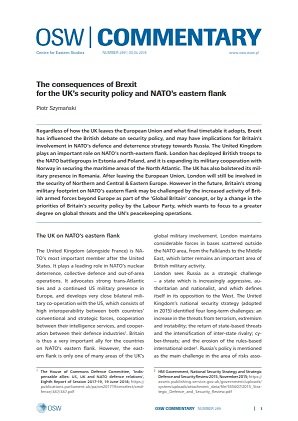The consequences of Brexit for the UK’s security policy and NATO’s eastern flank
The consequences of Brexit for the UK’s security policy and NATO’s eastern flank
Author(s): Piotr Szymański
Contributor(s): Jim Todd (Translator)
Subject(s): Governance, International relations/trade, Security and defense, Military policy, EU-Approach / EU-Accession / EU-Development, Geopolitics, Peace and Conflict Studies
Published by: OSW Ośrodek Studiów Wschodnich im. Marka Karpia
Keywords: United Kingdom; European Union; Brexit; NATO; security policy; security and defence; military policy; armed forces; peacekeeping operations;
Summary/Abstract: Regardless of how the UK leaves the European Union and what final timetable it adopts, Brexit has influenced the British debate on security policy, and may have implications for Britain’s involvement in NATO’s defence and deterrence strategy towards Russia. The United Kingdom plays an important role on NATO’s north-eastern flank. London has deployed British troops to the NATO battlegroups in Estonia and Poland, and it is expanding its military cooperation with Norway in securing the maritime areas of the North Atlantic. The UK has also bolstered its military presence in Romania. After leaving the European Union, London will still be involved in the security of Northern and Central & Eastern Europe. However in the future, Britain’s strong military footprint on NATO’s eastern flank may be challenged by the increased activity of British armed forces beyond Europe as part of the ‘Global Britain’ concept, or by a change in the priorities of Britain’s security policy by the Labour Party, which wants to focus to a greater degree on global threats and the UN’s peacekeeping operations.
Series: OSW Commentary
- Page Count: 6
- Publication Year: 2019
- Language: English
- Content File-PDF

